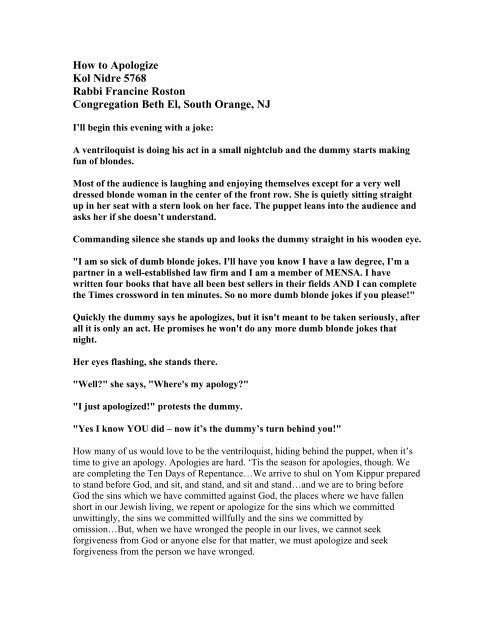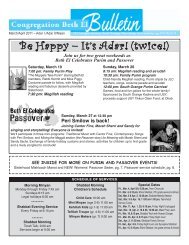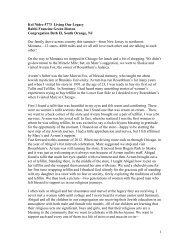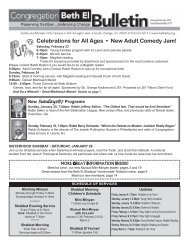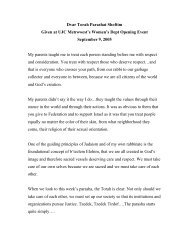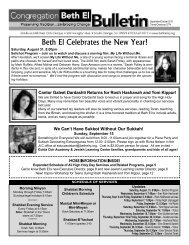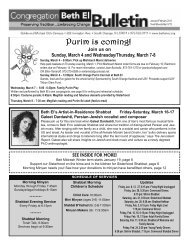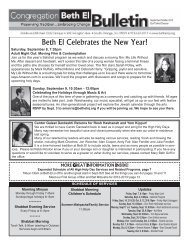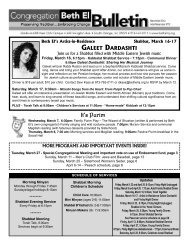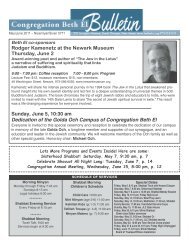Kol Nidre 5768, Sermon - Congregation Beth El
Kol Nidre 5768, Sermon - Congregation Beth El
Kol Nidre 5768, Sermon - Congregation Beth El
Create successful ePaper yourself
Turn your PDF publications into a flip-book with our unique Google optimized e-Paper software.
How to Apologize<strong>Kol</strong> <strong>Nidre</strong> <strong>5768</strong>Rabbi Francine Roston<strong>Congregation</strong> <strong>Beth</strong> <strong>El</strong>, South Orange, NJI’ll begin this evening with a joke:A ventriloquist is doing his act in a small nightclub and the dummy starts makingfun of blondes.Most of the audience is laughing and enjoying themselves except for a very welldressed blonde woman in the center of the front row. She is quietly sitting straightup in her seat with a stern look on her face. The puppet leans into the audience andasks her if she doesn’t understand.Commanding silence she stands up and looks the dummy straight in his wooden eye."I am so sick of dumb blonde jokes. I'll have you know I have a law degree, I’m apartner in a well-established law firm and I am a member of MENSA. I havewritten four books that have all been best sellers in their fields AND I can completethe Times crossword in ten minutes. So no more dumb blonde jokes if you please!"Quickly the dummy says he apologizes, but it isn't meant to be taken seriously, afterall it is only an act. He promises he won't do any more dumb blonde jokes thatnight.Her eyes flashing, she stands there."Well?" she says, "Where's my apology?""I just apologized!" protests the dummy."Yes I know YOU did – now it’s the dummy’s turn behind you!"How many of us would love to be the ventriloquist, hiding behind the puppet, when it’stime to give an apology. Apologies are hard. ‘Tis the season for apologies, though. Weare completing the Ten Days of Repentance…We arrive to shul on Yom Kippur preparedto stand before God, and sit, and stand, and sit and stand…and we are to bring beforeGod the sins which we have committed against God, the places where we have fallenshort in our Jewish living, we repent or apologize for the sins which we committedunwittingly, the sins we committed willfully and the sins we committed byomission…But, when we have wronged the people in our lives, we cannot seekforgiveness from God or anyone else for that matter, we must apologize and seekforgiveness from the person we have wronged.
Some of my strongest memories of this season are of apologies made to me. First, mycousin called me from Detroit a few days before Yom Kippur. She was calling toapologize for any insult she may have caused me at a family gathering. There had beensome tension as they were Orthodox and I was then studying to become a Conservativerabbi. Some words were said in jest—that were not funny to me but rather hurtful. I hadlet it go because I knew we had much in common in our love of Judaism. I had moved onbut I guess it had stayed with her and so she phoned me months later, during the AseretY’mai Teshuvah, to apologize, acknowledge the pain she had cause, express remorse andask for my forgiveness. I felt humbled in receiving her apology, that she had carried thehurt and that she had cared enough to reach out to me. I immediately forgave her andwished her an easy fast.One year, when I was a Seminary student, I davenned at the Seminary for Yom Kippur.As everyone was finding their seats and waiting for the services to begin, a classmate satdown next to me without invitation. Can I sit here? Sure, I said. I was a bit surprisedbecause we had not hit it off well and he had said some things in class that had reallyoffended me. I didn’t know what I was going to talk to him about, but I didn’t have toworry for long because he opened up with an apology. He turned to me with a serious,kind face and said “I want to apologize for offending you. I did not intend to bedisrespectful and I’m really sorry that I hurt your feelings. I hope you’ll forgive me.”While I wasn’t too sure about this guy and whether I could trust him in the future, in themoment his sincerity and vulnerability were moving. I spontaneously forgave him, weshook hands and services began.I’ve also experienced what I like to call the Drive-by apology. This is the person who ison a mission, doing their apologizing before Yom Kippur. He walks up to you and says“If I’ve offended you in any way over the past year, I apologize.” He stands there,smiling, might wait for an “OK” or an “I forgive you” and then rushes off to the nextpotentially offended person. Now, I know that this is a traditional gesture, and it can be aredemptive, repentant act opening up a conversation that reveals unknown ornonacknowledged wrongs, bringing true repentance and forgiveness. But it can bemisused as an easy way to get off the hook without acknowledging any wrong orexperiencing any remorse. How can you make sure you don’t commit the offense again,if you don’t even know what offense you committed ?!It seems that apologies are on the rise, in general, in our society. There have been somepretty interesting apologies in the news over the past year.
After it was revealed that Paul Wolfowitz, the former President of the World Bank hadpersonally orchestrated a high-paying job and guaranteed promotions for a bankemployee with whom he was romantically involved, he made this apology : I made amistake for which I am sorry. A mistake. Which mistake? What did he do? What was hetaking responsibility for? Did he mismanage funds? Misuse his power? Or mismatch hissocks? How do you know from that apology?Last year Pope Benedict XVI gave a speech in which he briefly discussed the Islamicconcept of jihad, saying that violence in the name of religion was contrary to God'snature and to reason. He also cited a reference to Islam as "evil and inhuman." [The nextweek Benedict said he was “very sorry” that his remarks precipitated a storm of angerduring which several churches were firebombed and extremist groups threatened thepope’s life. Three days later, he issued a second expression of regret, saying that hiswords, mostly about faith and reason, largely criticizing the West, had beenmisunderstood. ] Vatican Secretary of State Cardinal Tarcisio Bertone issued this apologyin an official statement: The pope " sincerely regrets that certain passages of his addresscould have sounded offensive to the sensitivities of the Muslim faithful and should havebeen interpreted in a manner that in no way corresponds to his intentions.”How many of us have received one of these apologies? I’m sorry that you misunderstoodme. I’m apologize but you misunderstood…but I didn’t do it on purpose…but I had avery good reason.. I’m sorry IF I offended you but that was not my intention. You weretoo sensitive. Read: it’s your fault, not mine….and not an apology. Shifting the blame ormaking excuses are surefire ways to sink an apology. The offended person is left standingthere wronged a second time without any sign that the offender understands hisshortcoming and has resolved not to repeat the offense. For good reason, these apologiesfall on deaf ears.It is really hard to apologize. It is so easy to slip into excuses. It is so easy to try toexplain away the offense. We want to minimize the pain of the person before us so thatour wrong is diminished. We want to minimize the discomfort we feel in making theapology so we might try to share the blame…I did this and, well, you did that. Sometimesit comes out this way: “We’ve both said unfortunate things.” Unfortunately, accusingsomeone of wrongdoing is not the key to their heart or the key to forgiveness.Why is it so difficult to apologize? Dr. Aaron Lazare, a psychiatrist & prof of psychiatry,and national expert on Apologies, asked several groups of high school students, medicalstudents and psychiatrists why they find it difficult to apologize. Their responses fell intotwo categories:In the first the offenders fear the reactions of the people to whom they apologize. “Imight not be forgiven; She might make a scene and never want to see me again; he mightfeel superior to me; the punishment could be severe; I would be opening myself up tohurt, the person might humiliate me…you never know how the other person will react.”The second group of offenders are less concerned with how the offended parties willreact to their apologies but are more concerned with feeling weak, incompetent, defeated,
guilty, ashamed, emotional, like a loser—in essence, Lazare states, losing their selfesteemor their very self. What is striking is that they suffer this fear not from theoffending behavior but from the prospect of apologizing, as if their shame and guilt willbe invisible if they don’t admit their wrong and apologize!Interestingly, Lazare points out that the two reasons why people avoid apologizing are thetwo main reasons for many people to apologize—out of internal feelings of guilt andshame or out of a strong desire to influence external factors such as how they are viewedor treated. Lazare encourages us to ask ourselves why we are having a difficult timeapologizing so that we can face our fears and stand them down “since the fears, on closerexamination, turn out to be much exaggerated. Most responses to genuine apologies areexpressions of gratitude.” There’s hope, Lazare is trying to teach us. Forgiveness comeseasily and spontaneously when the offended person experiences a true apology.There is one last reason I imagine holds people back from apologizing: they don’t knowhow. How does one find the words? How does one make sure it is a true apology and notone of those pseudo-apologies that often just makes things worse? How does one do it?How to apologize? First, an apology can’t be forced, just like forgiveness cannot beforced. Think of the way we often teach children to apologize: Sam hits Melissa. Melissascreams. Parents tell Sam hitting is unacceptable. What is his punishment? He has a timeoutand then he must apologize. The apology becomes part of the punishment!? No bigsurprise we avoid and fear apologies. My favorite is when the offending child mumbles aheartless apology and the offended child yells: I don’t accept it….what can you do?!Separate the parties, walk away and pray for bedtime!Apologies are done best in person and should follow a few guidelines. Maimonides givesgood advice in this regard in his teaching on repentance. Maimonides offers us a formulafor how to apologize to others. There must be a few critical elements for a sincere andeffective apology. First, one must honestly acknowledge what one has done. Thereshould be no attempts to explain or justify why one acted this way. “This is what I didand I’m truly sorry I acted this way.” No excuses to lessen the admission. Second, it mustbe heartfelt, honest remorse. Often missing in the coerced apologies of young children!Or top executives or celebrities, for that matter, in fear of their job or reputation. Then, ifit is possible, one must offer to make reparations; and last, one must promise not committhe offense again.“I’m sorry if I’ve offended you in the past year” is not really a true apology from thestandpoint of Maimonides’ teaching either. We are in synagogue for the next day withplenty of time to think and reflect. I imagine each one of us can think of reasons that weneed to apologize to others. I imagine we each have words that jumped out of our mouthsahead of our brains and hearts that hurt another’s feelings, humiliated them in public ormisrepresented the truth. Even if we did not intend to offend, we might have donedamage and that damage is our responsibility this day and every day.I encourage you to practice this Yom Kippur and offer at least one apology in the nextday to someone you have wronged or might have wronged. What better place and time to
do it when we are all feeling vulnerable, when we are all in need of healing, when we areall seeking forgiveness.Last, I wanted to share one teaching with you on forgiveness that might help youapologize. The Shulchan Arukh teaches that “An injured party should not be cruel anddeny forgiveness for this is not the way of the Jewish people. Once the person whocommits the injury apologizes once or twice, and it is known that he has turned awayfrom his sinful ways and regrets his evil, he should be forgiven. One who is quick toforgive is praiseworthy…”This teaching is not offered to force forgiveness; that is impossible. Forgiveness ISpraiseworthy AND also hinges on the delivery of a true apology that shows remorse,acknowledges the offense and the impact on the offended individual, and includes asincere pledge not to repeat the offense.Apologies can bring inner peace to the offender. Apologies can bring healing torelationships that are hindered by the breach of trust and pain that the offense caused.Apologies are steps on the path of repentance and what this season is all about. By theway, if you are struggling and need a little more time to form the words of your apologyso that it is without excuses and causes no further damage, there is a teaching that thegates of repentance stay open through Hoshana Rabba which falls this year on October____. Really, it is never too late for apologies.A friend was telling me about his recent brush with death and danger. He was flying in aplane when it all of a sudden shuddered, the engine surged and sputtered, and oxygenmasks dropped from the overhead bins. He said everyone was calm, the cabin was verypeaceful as an emergency landing was attempted and people hoped for the best andfeared the worst. The thoughts that stayed with him after he safely landed were thethoughts that went through his head when he thought his life might be over: who did hewish he called more often? With whom did he wish he had more time to spend? Towhom did he owe an apology that he had thus far failed to deliver? He’s resolved to try todo better on all these counts and hopes that he will stay on top of them without the needfor any more near-death encounters.We’re taught we are supposed to repent one day before our death. How are we to knowwhen we will die? We don’t so we are to treat every day as our last, ask the importantquestions and find the courage and strength to act on our good impulses.In this new year may we be relieved of the burdens of guilt and shame that we carry. Maywe choose words of healing over words of pain. May we be forgiven of our offenses aswe offer true and sincere apologies. And may we stand united before God in peace,prayer and teshuvah.G’mar Hatimah Tovah. May you have an easy fast and a good new year!


